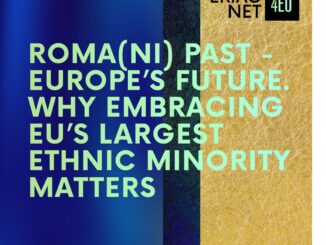
This ToR is developed, will be reviewed and approved by Executive Director of ERIAC and may be amended as necessary to accommodate any changes in the research scope or methodology.
- Background
Roma pride is an important aspect of the Roma community’s cultural identity and social advocacy. This research aims to support ERIAC with research and methodological devices for evidence based action to increase Roma identity and pride (Pillar 3 of the Strategy), to assist ERIAC`s mandate to make a positive impact on belonging, self-determination, and contribution to cultural and political life.
- Scope
– Measuring impact
Developing a sophisticated, viable and reliable methodology for measuring impact is essential to shift towards evidence-based decision making in the strategy pillar: Pride and Identity The researcher will develop the methodology and establishment of baseline indicators.
- Developing an operative methodology for measuring Roma pride
Research is scarce on the subject of measuring Roma pride, which is why ERIAC commissions the researcher to develop a tailor-made methodology for measuring impact. The methodology will reflect on the following underlying questions:
- What actions increase a positive sense of identity among Roma?
- How can Roma identity be activated for political/ civic collective action?
- What are the correlations between a sense of pride and an experience of discrimination? And how do these affect political mobilization?
Furthermore, it is clear that changing attitudes and building pride is a long-term engagement, which will not provide immediate results, and can last years, if not decades. This is why careful consideration of short- and mid-term results needs to be integrated into the methodology framework.
At the same time, the broader socio-political and economic contexts, as well as existing and emerging crises need to be considered as variables that affect the capacities of ERIAC and the network to generate change.
- Developing a baseline assessment and indicators
To be able to measure impact, ERIAC needs to develop a baseline assessment and connected indicators to assess the change generated in the field after ERIAC’s interventions. The baseline indicators need to consider the following analytical layers/ dimensions:
- Individual
- Community
- Institutional/ Organizational/ Infrastructure
- Actionable Recommendations for ERIAC; Case studies in selected locations
To test the extent of impact of ERIAC interventions regarding Roma pride, ERIAC will run pilot case-studies in selected locations. These selected geographies will be chosen strategically, both depending on the degree of importance for overall ERIAC operations as well as for the broader transnational network. Small-scale testing in strategic locations will be developed in locations with a significant size of Roma population. If Roma are already present in local administration (for example, Roma mayors), building institutional partnership will become an additional layer of action and analysis.
- Success indicators – ERIAC operations and Roma pride
Measuring pride is difficult and, in the Roma context, there is little reliable research on shifting attitudes among Roma themselves. At the same time, ERIAC needs clear feedback to be able to measure and adjust its scope of operations with the objective of increasing pride. To do so, ERIAC can measure:
- Subjective perceptions of individuals
- Community/ institutional/ organizational changes in the field
- Impact on cultural and political participation
With this in mind, some possible indicators include:
- Declared level of pride, belonging, solidarity immediately before and after the intervention, and long-term (survey and focus groups)
- Developing a connected scale of strength of identity may be considered
- Measuring shifts/ changes over time is key
- Cultural participation
- Statistics on attendance (IRL)
- Online metrics (visibility, likes etc.) before and after (analyzed by geography) before and after the intervention
- Invigoration of Roma arts and culture scene (increased number of cultural producers before and after the intervention)
- Increasing access to and engagement in culture among Roma
- Increase in number of arts and culture initiatives and spaces
- Growth in investment in arts and culture activities (increasing public funding, self-financing, cultural entrepreneurship etc.)
- Expansion of memorialization, and commemoration of local and international Roma history
- Timeline
The Call for Applications is Published on October 24th, 2024.
The application deadline is November 10. 2024.
The final research paper is due on January 31, 2025.
- Budget
The total budget for this research is 20.000 Euros. This budget for the research includes:
- Researcher fees or stipends
- Travel and accommodation expenses
- Materials and resources for data collection
- Any other relevant costs (e.g., transcription services, translation)
- In case of a team of researchers carrying out the task the budget remains the same.
- Reporting and Communication
The researcher will provide regular updates on progress and will submit the draft report for review. Final deliverables are the research paper containing the feedback of ERIAC on the first draft, and presentation of the research in both digital and print formats. The findings will be presented in meetings or conferences, as ERIAC`s output, with the mention of the researcher`s name.
- Roles and Responsibilities
- Researcher: Conduct research as outlined, adhere to ethical guidelines, and meet deadlines.
- Supervisor/Project Manager: ERIAC Management will oversee the research process, provide guidance, and ensure alignment with project goals.
- Stakeholders: The network of ERIAC together with the entities of the Roma Foundations for Europe, the Board, the Barvalipe Academy, and membership will be available for the researcher and also to provide feedback on draft reports and final deliverables.
- Ethical Considerations
The research shall be conducted with the highest ethical standards, including:
- Informed consent from participants
- Respect for confidentiality and privacy
- Sensitivity to ERIAC`s founding principals
- To Apply:
Please send the following pdf documents to gabor.feher@eriac.org, with the subject line “Researcher, Roma Pride”:
– CV (maximum 4 pages)
– Research plan (maximum 3 pages)
– Selected list of relevant publications/ research (maximum 3 pages)
– In case of research team every members of the team shall submit the CV and publication list, with one research plan on behalf of the team.
Latest by November 10, 2024.
- Approval and Amendments
This ToR is developed, will be reviewed and approved by Executive Director of ERIAC and may be amended as necessary to accommodate any changes in the research scope or methodology.
redaktionen@dikko.nu
Att vara en oberoende tidning kostar pengar därför använder vi oss av crowdfunding. Det innebär att människor med små eller stora summor hjälper till att finansiera vår verksamhet. Magasin DIKKOs insamlingen sker via swish: 123 242 83 40 eller bg: 5534-0046
Vill du annonsera eller sponsra, synas eller höras i våra media?
Kontakta oss på redaktionen@dikko.nu
eller ring 0768 44 51 61
IBAN: SE19 9500 0099 6042 1813 4395
BIC: NDEASESS




